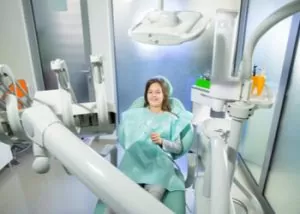While everyone’s tolerance for pain is different, you can rest assured that your dentist does a lot to make your experience as comfortable as possible, and tooth extractions are no exception. A lot of patients want to know ‘does tooth extraction hurt’ so we’ve put some considerations together to try to answer this for you. Let’s take a closer look at the tooth extraction procedure and what you might expect.
Understanding What The Point Of Tooth Extractions Actually Is
Ultimately, your dentist strives to save your natural teeth but sometimes this may not be possible.
Teeth that are badly damaged or decayed may not be able to be saved and may need to be extracted. But they also tend to be very painful too, and that is why so many patients are fearful of teeth extractions.
Remember though, that your long term dental health is of paramount importance so if your dentist recommends tooth extraction, it is with good reason. Removing a badly decayed tooth and bacteria removes the source of the pain from your mouth.
So, Does Tooth Extraction Hurt?
 Because your mouth is sensitive and your tooth roots may be firmly embedded, your dentist will use a local anaesthetic to numb the area so that you do not feel pain during the tooth extraction. This is not to say you won’t feel anything; in fact, you may still feel the pressure of the tooth being pulled on, but you should not experience a painful nerve impulse.
Because your mouth is sensitive and your tooth roots may be firmly embedded, your dentist will use a local anaesthetic to numb the area so that you do not feel pain during the tooth extraction. This is not to say you won’t feel anything; in fact, you may still feel the pressure of the tooth being pulled on, but you should not experience a painful nerve impulse.
In the event that you are having multiple tooth extractions or a very complicated procedure, you may be put under general anaesthetic. Sometimes if patients are having all of their wisdom teeth removed at once and the dentist suspects there could be complications, it may be a good idea to be put under general anaesthetic.
What About After The Tooth Extraction?
Your anaesthetic may take a few hours to wear off, after which time you might experience some tenderness, bleeding or swelling. Once the tooth has been extracted you are given a piece of gauze to bite down on, in order to curb the bleeding and encourage the blood to clot. It’s a good idea to keep your head elevated when lying down, so blood does not pool in your head.
If you follow your dentist’s aftercare instructions very closely, by not touching the site of the tooth extraction with your fingers or tongue and do not dislodge the blood clot, you should not feel pain. In the event that the blood clot is dislodged, you may experience very intense pain, which is symptomatic of a bigger issue that needs to be reported to your dentist. This is known as a dry socket and can be very painful. You can do your part to avoid it by
- Not touching the site with your tongue or fingers
- Drinking out of a straw
- Avoiding eating on that side of your mouth
- Not drinking very hot or very cold beverages
- Not smoking, as this can cause an infection
Your wound should heal a week or two after the tooth extraction and any discomfort you felt should improve in the days following your procedure. Any new or worsening pain could be a sign of secondary infection and should be reported to your dentist. Any pain that is accompanied by a fever, chills or dizziness should also be reported to your dentist for investigation.
Don’t Allow Your Fear Of Pain To Postpone Your Treatment
Any mild discomfort that you may experience as a result of tooth extraction is incomparable to the cost and complications that can arise if you leave a dead or decaying tooth in your mouth untreated. Allowing an infection to spread can compromise the health of your other teeth and soft tissues, as well as that of the underlying bone, causing more complications and more pain. The earlier you seek treatment, the more favourable the outcome is likely to be.
If you are concerned about the pain from tooth extraction, your dentist can prescribe pain medication for you to have on hand, in the event that it does become unmanageable. The important thing to remember is to have the treatment if you need it. There are options for pain management strategies if it is a major concern for you. If you experience a fever or an increase in bleeding, you should also contact your dentist.
If you still have questions like “does tooth extraction hurt?”, it’s time to get a professional opinion and assessment. Please contact us for a convenient appointment: (02) 8203 8760.




Recent Comments